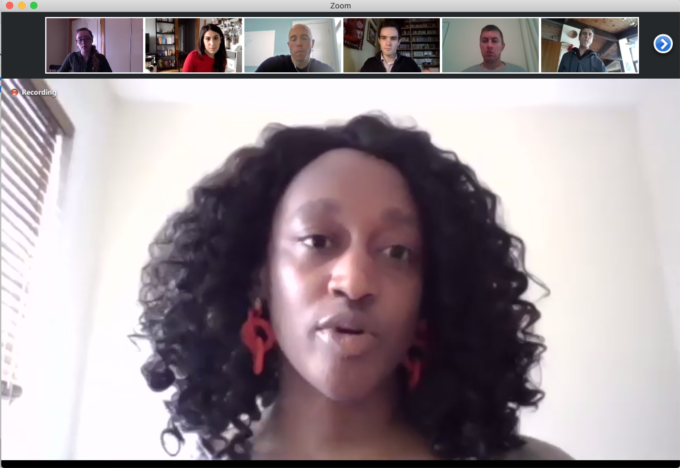The second installment of our Investor Speaker Series connected three impact investors from Greentown Labs’ network to our community of entrepreneurs to discuss what impact investing offers relative to traditional investing and how startups can tap into this type of funding.
The event featured Amy Duffuor, principal at Prime Impact Fund; Ryan Macpherson, portfolio and investment manager at Autodesk Foundation; and Adam Rein, co-founder of CapShift. Rein has plenty of experience to draw on as an entrepreneur—he’s also a co-founder of Greentown member Altaeros and a co-founder and board member of Greentown.
Here’s what they said about how impact investing can support startups, especially during times of crisis.
What is impact investing and how is it different from traditional investing?
Impact investing is where social responsibility and financial gain meet: impact investors only commit to viable companies that are capable of having a measurable environmental or social impact. This two-pronged mission sets them apart from traditional investors, who are (generally) solely focused on a financial return.
Because of this holistic approach, impact investors tend to have more flexibility. They often get involved with earlier-stage companies, aiming to de-risk the startup for follow-on investors. In this way, impact investors can be a standout resource for startups—for example, Duffuor describes Prime Impact Fund’s approach as “pro-entrepreneur.”
Some organizations also have latitude in terms of what types of funding they distribute. Macpherson explained that Autodesk Foundation provides a spectrum of funding, all the way from grants to more typical investments. He shared the story of Autodesk Foundation giving a $100,000 grant to a promising “pre, pre, pre-seed” company that then went on to flourish, and said the foundation recently invested in the company’s Series A funding round.
“There aren’t many sources of capital that can do both grant-making and equity investments,” Macpherson said.
Duffuor and Macpherson gave a window into how Prime Impact Fund and Autodesk Foundation evaluate companies. Prime Impact Fund focuses on companies that have the potential for gigaton-scale greenhouse gas reduction, where their capital is needed to catalyze the round, and could attract follow-on funding. Prime Impact Fund consults a group of investors to gauge answers to the second and third categories..
Autodesk Foundation asks three questions of companies, according to Macpherson: could this company have a meaningful impact? Can this company succeed? And is Autodesk Foundation the right organization to help make that success happen?
What do startups that are seeking impact investments need to know?
As a startup, you need to get inside the head of your desired impact investor. What types of impact do they care about? How can you or they measure that impact? Are you as committed to this social good as they are?
To speak the language of impact investors, Rein suggests startups position themselves around impact themes rather than tech sectors, showcase the impact they could have in five to 10 years, and put forth a few ways to quantitatively measure that impact over time.
The panelists agreed that the best startup presentations appeal to the investors’ sense of mission.
“I really like to hear the story of how you came to this problem and what you believe your solution can be solving—I think that provides a personal touch,” Duffuor said. “Injecting that sense of self can be really helpful for giving people a more nuanced understanding of your company and also you as a leader.”
How is COVID-19 affecting impact investing?
COVID-19 means that impact investors have social good on the brain, Rein said. He expects impact investors to fund many companies that are doing work either to counteract the virus or to ameliorate its wide-ranging impacts.
That being said, like traditional investors, impact investors are turning to supporting their portfolios during this period of economic uncertainty and are less likely to make new investments. The panelists recommend startups seek out organizations that recently raised a fund, as they are most interested in new deals.
The panelists encouraged Greentown members to think creatively about what they can do to fortify their businesses during this time.
“There’s an element of looking for opportunities,” Duffuor said. “In every downturn, there’s always going to be a small, bright light. We’re thinking creatively with our portfolio teams to figure out what that is, such as ethically renegotiating with suppliers to extend payment terms.”
Duffuor also pointed out that some mission-driven impact investors are seeing the current economic downturn as a directive to step up to the plate and support cleantech entrepreneurs.
“While conventional sources of capital may retreat, we know that the area we’re funding, climate innovations—that demand doesn’t ebb and flow with the market; [climate change] is a persistent, existential threat,” she said. “We find that it’s become even more important for us to have a presence and to continue to make investments given the current climate.”
The Investor Speaker Series is part of Greentown Labs’ commitment to support startups as they navigate the impacts of COVID-19. To learn more about these efforts, follow us on Twitter or check out our blog.


